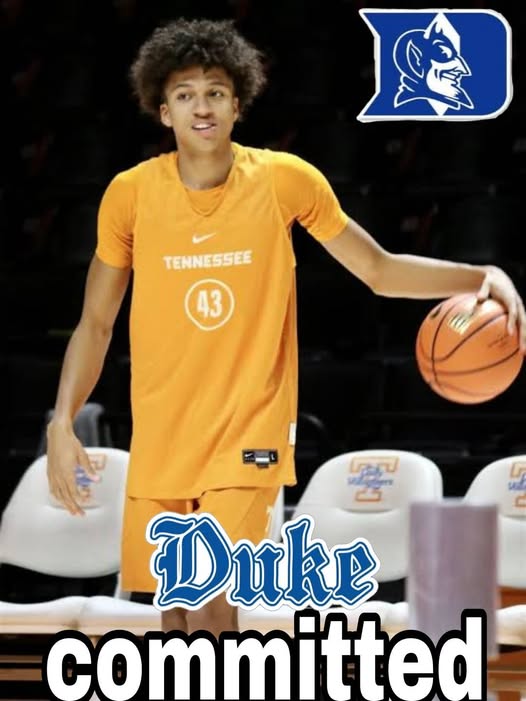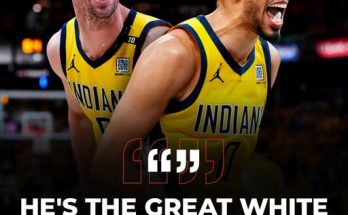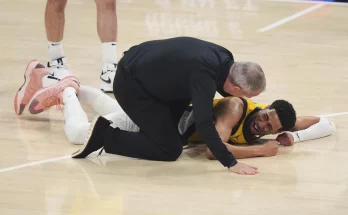When Cameron Carr made waves in the college basketball world, few would’ve predicted his rising prominence not only on the court but also in the realm of fan discussion. Carr, an electric and promising young talent who has bounced between the radar of top programs and scouting services, is more than just a player—he’s a thinker of the game, a student of basketball culture, and an unabashed admirer of Duke basketball.
Recently, during a sit-down interview on a podcast that caught the attention of hoops fans nationwide, Carr revealed something that sent social media abuzz: “If I had to choose who I prefer—Duke basketball, hands down.” A bold statement, considering the allegiance battles that brew in college basketball circles.
Though Carr didn’t finish his sentence with “over [insert rival school here],” the implication was enough to stir up speculation, pride among Duke fans, and even a few raised eyebrows from rival programs. But the story doesn’t end with just a preference. What makes this revelation interesting is why Carr feels the way he does. In his own words, and supplemented with deeper insight, here are the three major reasons why Cameron Carr prefers Duke basketball above all others.
1. The Brotherhood is Real
The first thing Carr mentioned when elaborating on his Duke preference was a term deeply embedded in the program’s DNA: The Brotherhood.
“I’ve seen it up close, I’ve talked to guys who’ve been through it—and it’s different at Duke. It’s not just a program, it’s a lifelong bond,” Carr said.
The Brotherhood isn’t just a catchphrase slapped onto recruiting graphics. It’s an ethos. From Grant Hill to Jayson Tatum, from Shane Battier to Zion Williamson, Duke has cultivated a culture where players remain tightly connected long after their days in Durham are over. This isn’t just a branding tool—it’s a genuine support system that players can lean on during their college years and beyond.
Carr, who has trained with and been mentored by former college and NBA players, understands how rare and valuable that kind of culture can be. Many college basketball players often lose touch with their programs once they head to the NBA or overseas. But at Duke, the relationships stay. There’s a distinct alumni pipeline that fosters not only mentorship but also business opportunities, personal growth, and even post-basketball life guidance.
Carr noted how former Duke players like Quinn Cook and JJ Redick routinely speak about their continued loyalty to the school. Kyrie Irving, for all his basketball wandering, remains closely tied to the Duke family. There’s a unifying bond that transcends wins and losses—it’s about identity.
“When you go to Duke, you’re not just repping the jersey for a year or two. You’re a Blue Devil for life,” Carr emphasized.
In a college basketball era where loyalty is often fleeting due to transfers, early NBA departures, and NIL incentives, that kind of lasting fraternity matters to players like Carr—who view the sport as a long-term journey, not a short-term hustle.
2. Duke Demands the Best—And Gets It
While some college programs build around individual talent and allow star players to shine in isolation, Duke has always been known for its excellence in development, elite expectations, and big-time success—not only in the ACC but on the national stage.
Cameron Carr admires the fact that playing at Duke is like walking a tightrope of greatness.
“At Duke, nothing less than a national championship is acceptable,” he said. “The standard is so high that if you’re not built for that kind of pressure, you’re not going to survive. I love that.”
Carr isn’t shy about seeking elite environments. That’s why Duke’s track record of grooming both raw high school talent and transfers into refined products stands out to him.
Let’s not forget that Duke has consistently produced top-tier NBA players for decades. Whether under Mike Krzyzewski or Jon Scheyer, the Blue Devils have remained a premier launchpad for future professionals. In recent years, we’ve seen players like Paolo Banchero, RJ Barrett, Zion Williamson, and Brandon Ingram take that next step with poise and preparation.
“The guys coming out of Duke are ready—ready for the NBA, ready for adversity, ready to lead,” Carr explained.
That preparation starts with the coaching staff’s refusal to settle. Whether it’s the intense summer workouts, the pressure-packed Cameron Indoor games, or the grind of ACC competition, Duke teaches its players how to face elite competition every single day. Carr thrives off competition, and to him, Duke’s program is a crucible of excellence.
Even Coach Scheyer, a former Duke player himself, has adopted a “no shortcuts” mentality. His emphasis on defense, team-first mentality, and basketball IQ has won over high-profile recruits and transfers alike.
Carr sees Duke not just as a school, but as a proving ground. He’s drawn to the pressure, to the limelight, to the expectation that nothing but greatness will do.
And let’s be real—Duke games are events. Whether it’s College GameDay rolling into town, celebrity alumni in the stands, or the electricity of the Cameron Crazies, Duke provides the showtime vibe that few other programs can match.
3. Legacy Meets Modern Swagger
The third reason Carr gave may surprise some: “Duke is the perfect mix of legacy and swagger.”
A lot of schools have history. A lot of schools have hype. But very few can combine both without tipping the scale too far in one direction. Duke does.
Carr praised the ability of Duke to honor its legacy—Coach K, Christian Laettner, national titles, ACC dominance—while also evolving with the times. NIL deals, modern branding, social media presence, and cultural relevance all matter in today’s college basketball landscape.
Duke hasn’t just embraced the change—it’s owned it. The team’s social media platforms are some of the most engaging in college sports. The Brotherhood brand has become a merchandisable identity. Players are encouraged to build their own platforms while upholding the program’s core values.
Carr pointed out how players like Trevor Keels, Jeremy Roach, and Tyrese Proctor have balanced old-school toughness with new-school swagger. They play with passion, they talk their talk, but they earn the right to do so. It’s that balance of grit and flash that Cameron Carr finds magnetic.
“You can play with flair at Duke, but you have to back it up with defense, with hustle, with team play. That’s my kind of ball,” he said.
And let’s not forget the impact of Cameron Indoor Stadium—an arena where legends are made. The intimacy of the space, the ferocity of the fans, the history on the walls—it all adds to the mystique. Carr has visited other iconic college venues, but says nothing touches the experience of a Duke home game.
“You walk into Cameron, and it feels like you’re stepping into basketball heaven,” he added.
This unique blend of past and present, discipline and style, pressure and opportunity, is what makes Duke stand above the rest in Carr’s eyes.
What This Means Moving Forward
While Carr has yet to officially commit to any program, his vocal admiration of Duke makes it clear that the Blue Devils hold a special place in his basketball heart. Whether or not he ultimately dons the royal blue jersey is up for fate and recruitment twists to decide—but the reverence he has for Duke speaks volumes about how the program is perceived by the next generation of players.
In an era where college programs are racing to adapt to player empowerment and the realities of NIL, Duke has managed to retain its prestige without losing touch with what makes the game beautiful.
Carr’s three reasons—The Brotherhood, high standards of excellence, and the legacy-modern swagger fusion—are echoed by many of today’s top recruits and transfers. And for a player like Carr, who values growth, loyalty, and spotlight, Duke represents the dream.
Final Thoughts
Cameron Carr didn’t just throw out a casual opinion—his preference for Duke basketball stems from deep admiration, experiential knowledge, and a belief in the program’s core values.
He sees Duke not as a stepping stone, but as a summit—a place where basketball excellence isn’t just taught but expected. A place where friendships turn into brotherhood. A place where past legends inspire present players. And above all, a place where greatness is the standard, not the exception.
In Carr’s words, “Some schools have hype. Some have history. Duke has both—and that’s why I’d ride with them every time.”
No matter where Carr ends up, it’s clear that the echoes of Cameron Indoor will always be in his mind. And maybe, just maybe, the echoes will one day be his own.



